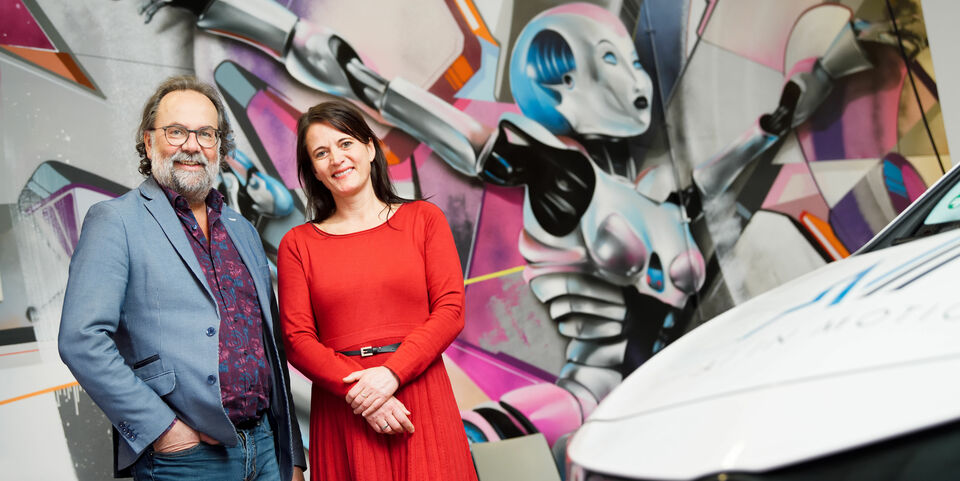Crisis doesn’t seem to affect Eindhoven Engine
Eindhoven Engine secured over twenty new notifications for project proposals for its third open call yesterday, more than twice as many as expected. It seems this partnership between TU/e, Fontys, TNO and the industry hasn’t been affected by the crisis yet. TU/e professor Maarten Steinbuch, who serves as the institute’s scientific standard bearer, is also thinking about setting up an operational platform for a potentially new knowledge workers program.
“We don’t see signs of any possible consequences of the corona crisis at this point,” Steinbuch and managing director Katja Pahnke say in unison. Although Steinbuch must admit that it can be somewhat of a challenge to keep the team connected via laptop alone. “That’s much easier when you meet in person in the MultiMediaPaviljoen. But I’m sure that’s true for many other locations as well.”
The institute’s third open call resulted in over twenty new notifications for project proposals yesterday, Pahnke says. “A significant increase compared to the first two rounds, and that offers us the possibility, or rather, the luxury to pick the best ones. Naturally, we take into account the quality standards, as we did with previous projects. The submitting parties will further develop their project proposals in the coming month. The completed plans will then have to be handed in on June the 4th.”
Region Deal Brainport
Projects that hold the most potential in the opinion of Eindhoven Engine will benefit from financial support with recourses that were made available to the institute by Region Deal Eindhoven. Steinbuch: “Eindhoven Engine was allocated a sum of 15 million euros from those recourses, and we’ve earmarked two million euros for this third round. We invest a maximum of 500.000 euros per project. We expect the submitting party to match this amount with three million euros, if they wish to receive maximum funding. This amount can be either a financial contribution or a contribution made in kind. And the submitting party is allowed to add the grants it was awarded by different organizations. When everyone asks for the maximum sum of half a million euros, we can get started again with four new projects.”
The assessment is carried out by an independent team of experts, a cross section of people from industry and knowledge institutions. Pahnke: “That group is made up of both young people and very experienced veterans with different backgrounds, and they assess whether the projects correspond fully to Eindhoven Engine’s principles.” According to Steinbuch, this means they need to “help unlock the collective intelligence that is present here, so that we can speed up the innovative processes here in the region. That will probably be even more necessary after the crisis than it already is now.”
Renovation
Everything is supposed to take place in the MultiMediaPaviljoen. Real estate management company Kadans, which owns various buildings on the TU/e campus, including Kennispoort and the Meulensteen House of Robotics, will carry out a renovation in the coming months that needs to physically support that ambition, Pahnke says. “A great deal of attention will be devoted to light and air, and to an innovative environment. There will be a cafeteria, and the indoor garden on the first floor will remain intact. Completion is scheduled for the end of 2020.”
Meeting each other goes beyond a short conversation at the coffee machine, Steinbuch says. “We came up with a structured approach for that, in which we use workshops, seminars and fixed contact moments. Everything is aimed at community building, which needs to lead to an open exchange of ideas.” Over the longer term, the aim is that the Singularity University, with which Steinbuch is affiliated, will have its own place in the MultiMediaPaviljoen where it will provide workshops.
Activity
Pahnke estimates that some two hundred people are currently part of Eindhoven Engine, but they’re not present in the MultiMediaPaviljoen every day. “But we expect that this number will have grown to about five hundred in two to three years, and that two hundred people will be present here daily by that time. We will work with flexplaces, people won’t have fixed workstations, instead they’ll be working at various places in the building, and this will not only lead to more activity, but it will also help foster communication and creativity in the workplace.”
Steinbuch also thinks that involving students in the projects carried out in the MultiMediaPaviljoen will bring many opportunities. “You can have students from various disciplines collaborate in one project here. You could have business management students work out a business plan, or let nursing trainees follow part of their internship at one of the medical/technical projects. These students could come from both TU/e and Fontys.”
The latter educational institution and third partner TNO could perhaps also team up with Eindhoven Engine in an operational platform for a potentially new knowledge workers program, Steinbuch believes. “If it becomes necessary in the foreseeable future for companies to temporarily transfer their employees to knowledge institutions, as happened ten years ago, Eindhoven Engine would certainly like to play a role in that. People are welcome here, but we can also play an intermediary role to help them find the right position.”


Discussion